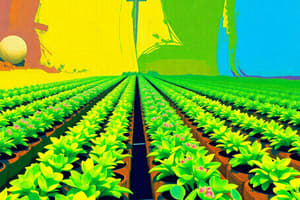Podcast
Questions and Answers
Why is understanding plant genetics important for improving plant production?
Why is understanding plant genetics important for improving plant production?
- To identify and manipulate genes for desirable traits like disease resistance (correct)
- To preserve plant species and maintain biodiversity
- To develop effective control strategies for plant pests and diseases
- To study the relationships between plants and their environment
What is the study of the relationships between plants and their environment called?
What is the study of the relationships between plants and their environment called?
- Plant Physiology
- Plant Ecology (correct)
- Plant Pathology
- Plant Genetics
Which field involves the genetic modification of plants to improve production and development?
Which field involves the genetic modification of plants to improve production and development?
- Plant Production Systems
- Plant Ecology
- Plant Conservation
- Plant Engineering (correct)
What is the purpose of plant conservation?
What is the purpose of plant conservation?
Why is plant pathology crucial for plant health?
Why is plant pathology crucial for plant health?
Which study involves the physical and biochemical processes within plants?
Which study involves the physical and biochemical processes within plants?
What is the first stage of plant development?
What is the first stage of plant development?
During the vegetative growth phase, what does the plant absorb from the soil?
During the vegetative growth phase, what does the plant absorb from the soil?
What happens during the reproductive growth phase of a plant?
What happens during the reproductive growth phase of a plant?
Which aspect involves the selection and cross-pollination of desirable plant traits?
Which aspect involves the selection and cross-pollination of desirable plant traits?
During which stage does photosynthesis take place in plants?
During which stage does photosynthesis take place in plants?
Which of the following can influence germination rates and success?
Which of the following can influence germination rates and success?
Flashcards are hidden until you start studying
Study Notes
Plant Production and Development
Introduction
Plant production and development refer to the processes that allow plants to grow from seeds into mature organisms capable of reproduction. Understanding the biological, ecological, and agricultural aspects of these processes is crucial for ensuring food security, maintaining ecosystems, and advancing our knowledge of these fascinating organisms.
Plant Germination
The first stage of plant development is germination, where the seed breaks through the soil surface and begins to grow roots and shoots. A variety of factors, such as temperature, moisture, and soil composition, can influence germination rates and success.
Vegetative Growth
Once the plant has germinated, it enters the vegetative growth phase, where it grows roots and shoots. During this phase, the plant absorbs nutrients from the soil, converts sunlight into energy through photosynthesis, and grows through cell division and expansion.
Reproductive Growth
The final stage of plant development is reproductive growth, where the plant produces flowers, which eventually develop into fruits or seeds, depending on the plant species. During this phase, the plant redirects resources away from vegetative growth and into reproductive structures.
Plant Breeding
Plant breeding is a crucial aspect of plant production and development, involving the selection and cross-pollination of desirable plant traits to produce new, improved varieties. Breeding can be used to develop plants with higher yields, better resistance to pests and diseases, or unique flavors and aromas.
Plant Pest and Disease Control
Maintaining healthy plants is essential for maximizing production and quality. Plant pests and diseases can significantly reduce yields and threaten entire plant populations. Therefore, understanding the biology of these organisms and developing effective control strategies is vital for ensuring successful plant production and development.
Plant Genetics
Understanding plant genetics is essential for understanding and improving plant production and development. Genetic research can help identify and manipulate genes responsible for desirable traits, such as disease resistance and drought tolerance, which can be used to develop improved plant varieties.
Plant Ecology
Plant ecology is the study of the relationships between plants and their environment. Understanding these relationships is crucial for understanding plant production and development in the wild and can help inform agricultural practices.
Plant Physiology
Plant physiology is the study of the physical and biochemical processes that occur within plants. This includes understanding nutrient uptake, photosynthesis, and other metabolic processes, which are essential for plant growth and development.
Plant Pathology
Plant pathology is the study of plant diseases and the organisms that cause them. Understanding plant pathology is crucial for developing effective control strategies and improving plant health.
Plant Production Systems
There are various plant production systems, including traditional farming methods, industrial agriculture, and organic farming. Each system has its advantages and disadvantages, and understanding these systems is crucial for selecting the most appropriate method for achieving desired production and development outcomes.
Plant Conservation
Plant conservation is the practice of preserving plant species and their habitats to maintain biodiversity and ecosystem health. Conservation efforts are essential for maintaining the health of ecosystems and ensuring the availability of plant resources for human use.
Plant Engineering
Plant engineering is an emerging field that involves the genetic modification of plants to improve their production and development. This can include developing plants with increased resistance to pests and diseases, higher yields, or improved nutritional value.
In conclusion, the field of plant production and development encompasses a wide range of topics, from basic plant physiology and ecology to advanced plant breeding and engineering. Understanding these processes is crucial for ensuring food security, maintaining ecosystems, and advancing our knowledge of these fascinating organisms.
Studying That Suits You
Use AI to generate personalized quizzes and flashcards to suit your learning preferences.




